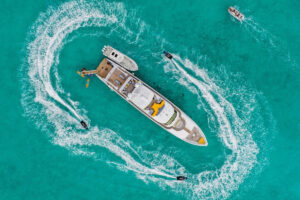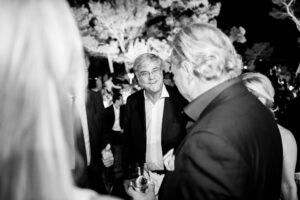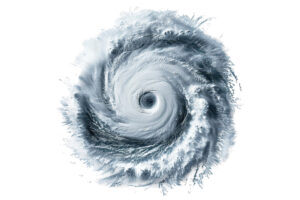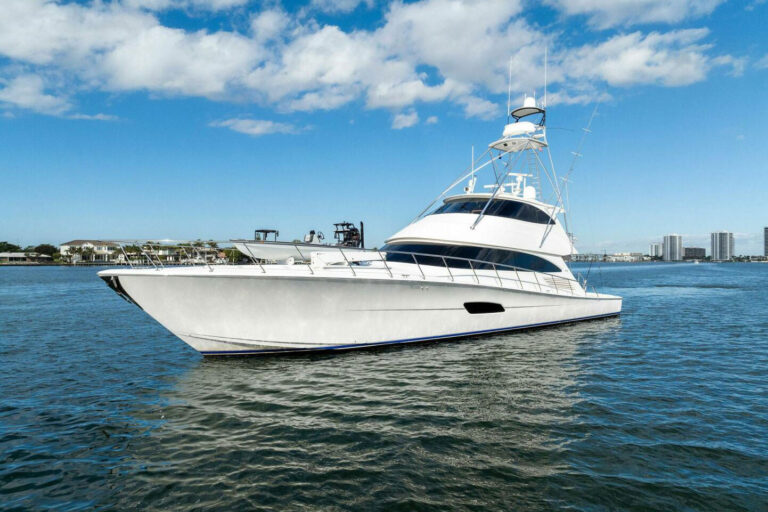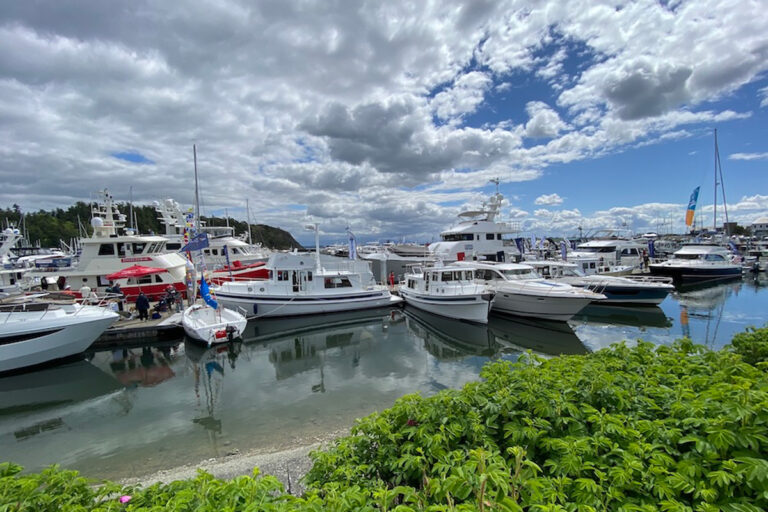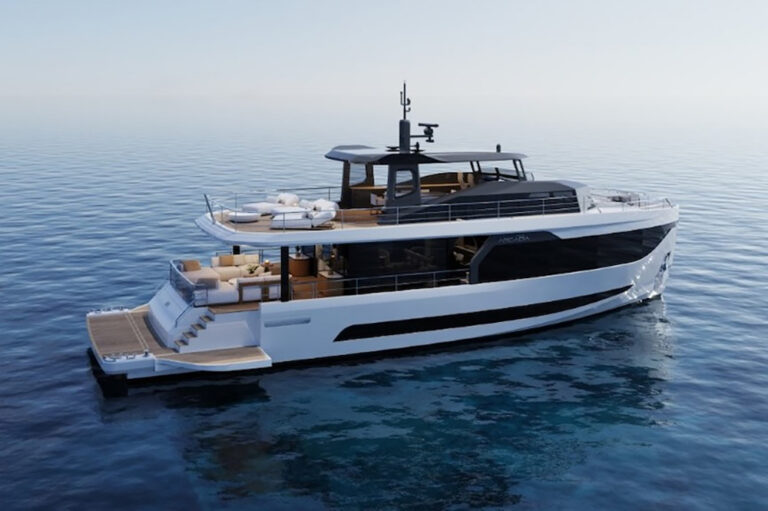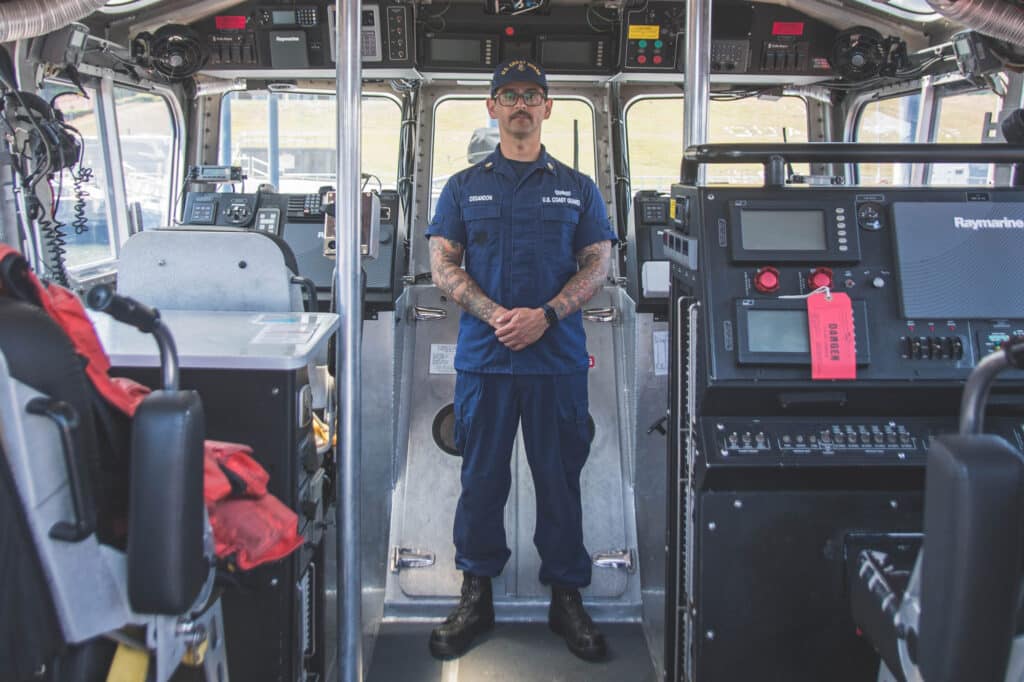
Just outside the Fort Pierce Inlet in Florida, a sinking pontoon boat with 10 passengers was hurtling toward a disastrous collection of rocks. That’s when US Coast Guard Boatswain’s Mate 1st Class Hernán Ossandón, who was a seaman at the time, and his team diverted from their training and headed out for Ossandón’s first rescue mission. It meant securing the boat and towing it away from the rapidly approaching rocks before transferring the passengers to a 47-foot rescue boat. Among them were several children and a pregnant woman. It wasn’t until Ossandón became a father in 2015 that he realized the impact of his team’s actions that day. Now a father of two, he looks back on that mission as being one of the most significant he’s ever undertaken. “After becoming a dad, cases with children are different. You just want to get there as fast as you can,” Ossandón told Yachting. “I can’t imagine the pain of a parent to know that their kid is in distress.”
Who or what was your inspiration for joining the Coast Guard?
Ossandón: So, I was a lifeguard. I was a lifeguard for about seven years, and, on my last year—’cause I came into the service when I was 24—my last year, I saw this orange boat. I had no idea what the Coast Guard was. And I see this orange boat out on the water, and I’m like, “Who are they? What are they?” And they were like, “Oh, that’s the Coast Guard,” and I’m like, “What is the Coast Guard?” And they were explaining to me, like, “Oh, they do search and rescue,” and all this stuff. And then they came to the beach, right, with the uniform, and I was like, “What do you guys do?” Oh, let me tell you what we do. They were explaining to me, like, search and rescue, save people under water. And I was all about it. And I really loved being a lifeguard back then, and then I was like, “Oh, I think that’s what I want to do.” And, actually, I wasn’t even a citizen at the time or a permanent resident. I had political-asylum status (from Chile), so I couldn’t do it. And that was in the summer of 2005. We were in the process of getting my green card. By January, I got my card, and the same day, I went to the recruiter, and I was like, “Sign me up.” So they signed me up. I ended up in their reserves site ’cause I was finishing college. And it wasn’t it. I don’t wanna do this. I wanna do active duty. So I went back to my recruiter, and I was like, “I wanna be active duty.” And he was like, “Where do you wanna go?” “I wanna do search and rescue.” “Where?” “Florida.” He’s like, “Here you go.” So I ended up going to Coast Guard Station Fort Pierce; that was my first unit. And, yeah, fell in love with what we do, you know?
I was finishing up college. I was doing electrical engineering, and I got offered guaranteed MK school—the machinery-technician school—but I had no idea what it was or anything. “Oh, you’re gonna be fixing engines and stuff like that.” And I’m like, “I don’t wanna do that.” So I went active duty as a nonrate without a job. When I went to this station, I learned a little bit more about MKs and Boatswain’s Mates. Boatswain’s Mates are the ones driving the boats. Had a good friend that was a third class, and he let me drive the boat as a nonrate, and I drove all the time. And I was like, “Oh, this is what I want to do.” So I put my name on the A-school list; that’s where we get our rate. And I went BM.
As soon as I found out what [the Coast Guard does], it was closed-case. As a lifeguard, I had saved quite a few people, but it’s not the same, though. I’ve done it almost 18 years, and it doesn’t compare to that. ‘Cause, when you go out there, you’re it, you know?
I ended up being a lifeguard because, in high school, I took the lifeguarding course, and I wasn’t even a good swimmer at the time, and then I liked it—like, the whole concept of being out there, being responsible for someone. I always liked the military. Tried to do the marines, the Navy and all that, but, since I didn’t I have the green card, it wasn’t a go. Yeah, I mean, I could’ve gone the other way, but I think this was the right calling. And, then again, I was gonna do it for four years. Almost 18 years later? Two more, I’ll be retiring, hopefully.
I always wanted to be part of the United States Armed Forces, even when I was living in Chile. You can blame Top Gun for that, haha.
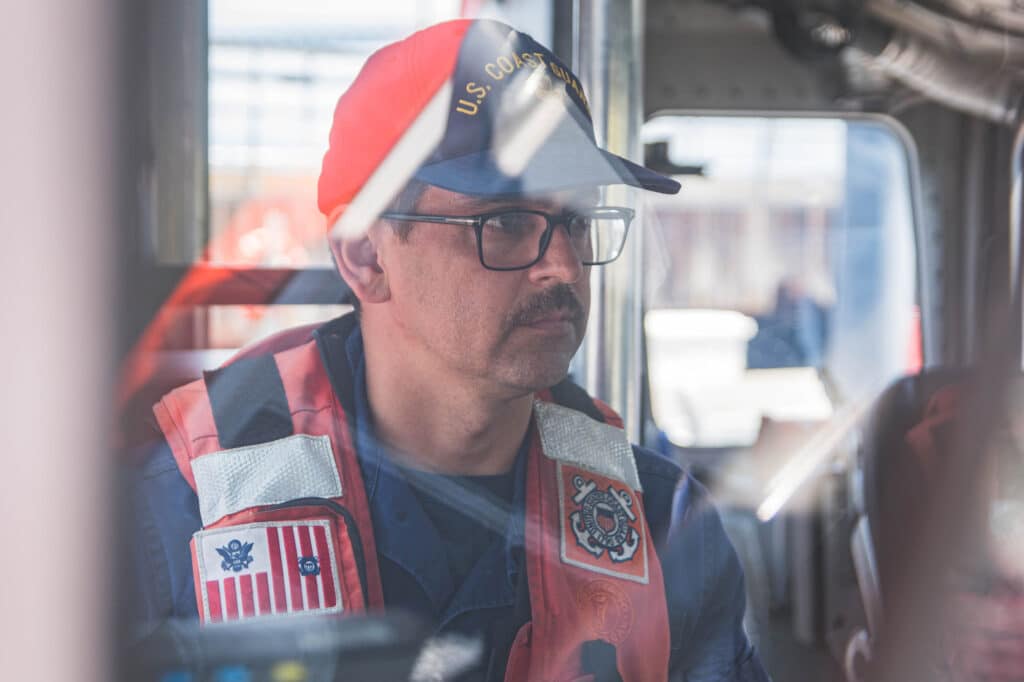
What do you aspire to achieve in the Coast Guard?
Ossandón: I would definitely like to be a chief petty officer. I would like to retire as a chief, but, then again, who knows? Maybe I’ll continue. Like I said, I love what I do. It’s not a job. Every day is different. You deal with all sort of different kind of people. I’ve met hundreds of people in my years, and everyone is unique in their own way, and, whenever we all come together, it’s that brotherhood, sisterhood of all wanting to do the same thing, you know? I think I’ve done everything that I wanted to do, to tell you the truth.
After almost 18 years of service, what kind of impact have you left on the Coast Guard?
Ossandón: I think the Coast Guard, as the organization itself, I wouldn’t go that high [regarding the mark I’ve left], but I would say that I’ve made good impact on people that I’ve met. Not gonna say every single one of them because it’s hard to be okay with everyone, but I have quite a few friends that tell me, like, “Because of you, it’s where I’m at; because of your example, it’s where I’m at.” I used to be very hard on people sometimes—not over-power-tripping or anything like that, but it’s just so they could see how to do right in a positive way. But I think that’s something I’m proud of—that the fact that people looked up to me, and when they tell you thank you for this; thank you for that; thank you for helping me here—it’s rewarding. Now I have one of the kids that was stationed here. He didn’t have a job; now, he’s gonna become a first class in less than three years. It’s amazing. He’s like, “I’m doing what you told me to do.” So, you know, those kind of things kinda, like, fill your heart.
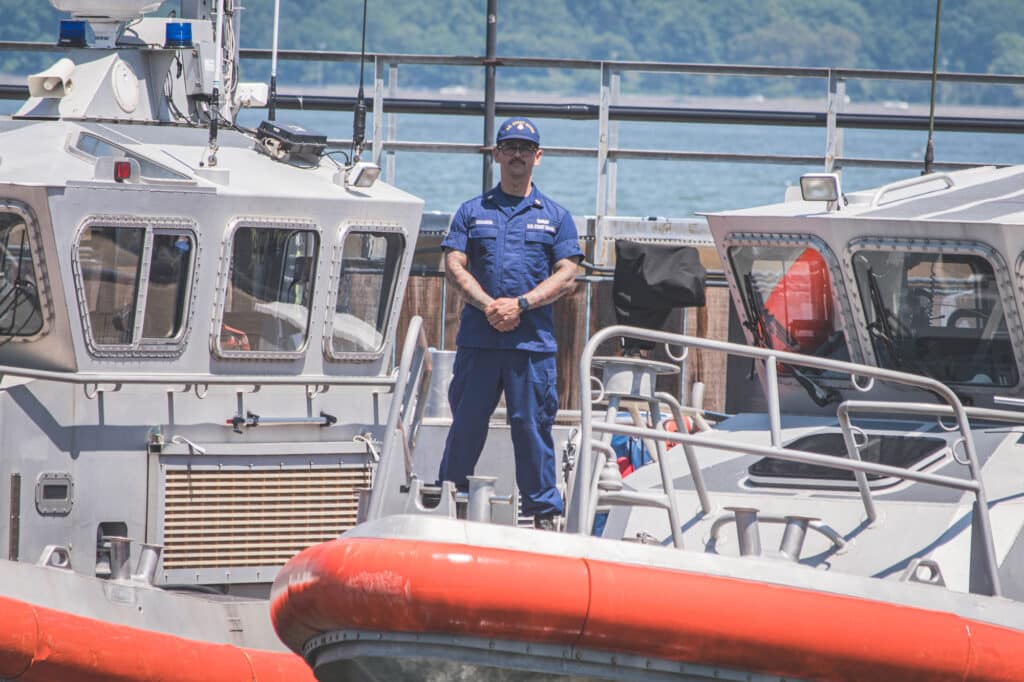
You talked about the example you set for people around you and how some of them have come back to give thanks for the example you set for them. Can you talk about the way you displayed leadership and enforced discipline?
Ossandón: I believe that, in order to discipline anyone within our service, you must do it behind closed doors. I like having a witness with me at the time—usually someone with my same rank. I like to be direct. Tell them what the member did wrong, how to fix it and what will happen if it happens again. There is no need to be power-tripping or screaming since we are all adults. I don’t want junior members to fear me but to respect me. And to be respected, you have to respect them as well.
Can you please recount your most interesting story with the Coast Guard?
Ossandón: It was my first case—ever. So, I was at Fort Pierce as a nonrate. And I was training; I wasn’t even qualified at the time, and I remember Petty Officer Twito, who was driving the boat, and we’re doing training. And then, out of the blue, we get this call. And, again, I wasn’t qualified, so I was just learning. And we get this call about this boat sinking, taking on water. So, they were like, “Alright, pack it up. We’re going out.” So, by the time we go out, the boat was in the inlet. Right, so they didn’t have a prop or an anchor. So, they were about to drift into the rocks. So, I tell them, like, “You want me to go up?” He’s like, “No, stay there; you know what you’re doing.” And I stay there, right? We got on scene with this tiny, little pontoon boat. When we’re getting ready to tow them out, so I throw out the line, and the person go and try to put it there; they ripped it from where it was connected, and then everybody freaked out because they were so close to the rocks, so people moved forward, so the boat tilted. We were finally able to put them in a tow, and we got them out. So when we got them out, we transferred them to our boat, to a 47-footer, and there were three kids, and one of the ladies was pregnant. So we transferred them. And, just, taking care of them, being able to save them; they didn’t have life-jackets. It could’ve been a mess. Maybe at the time, with the kids, it didn’t make that much sense. I didn’t take it as much; “Oh, they’re kids.” But now that I’m a dad, it’s rewarding.
I will never forget my first search-and-rescue case. I was still learning how to be a crewman. It was during training that we had the call over the radio: “Vessel drifting towards the rocks in the vicinity of Fort Pierce Inlet.” It was an overcrowded vessel, with a pregnant woman and a few children on board, among others. At the time, you don’t really think too much, but, when you get there and see them, everything changes. I was nervous; I thought I wasn’t ready, [that] I wasn’t qualified to be part of the rescue, but I remember the words of encouragement from the coxswain, BM2 Michael Twito (now a chief warrant officer): “Stay on the aft deck! You know what to do!” He smiled and gave us orders to proceed. We rescued about 10 people.
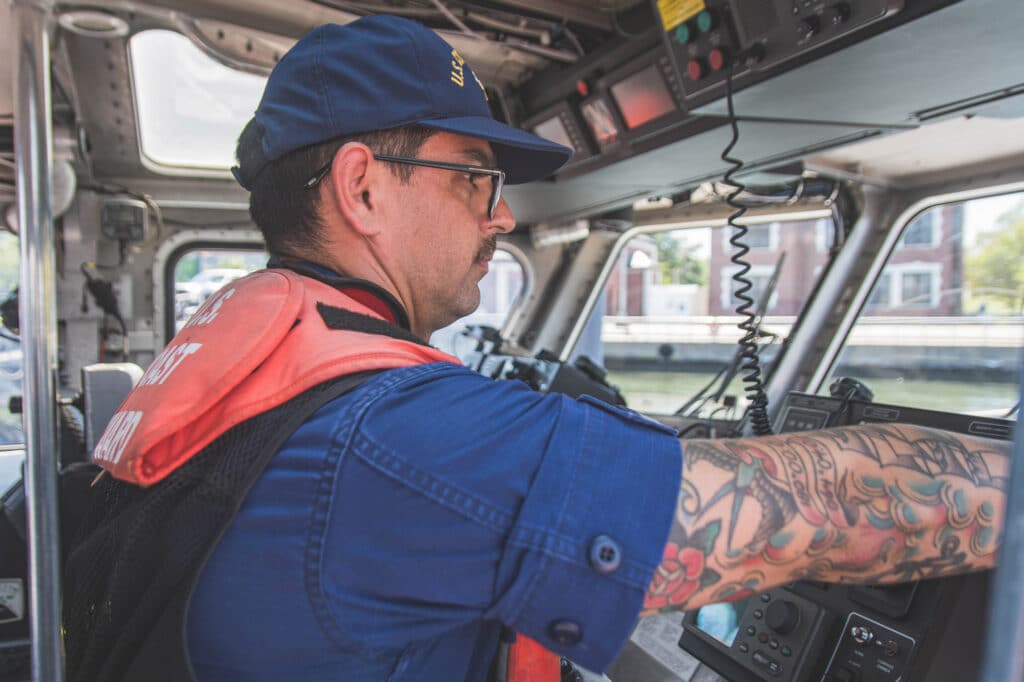
How has fatherhood changed/affected your personal and professional lives?
Ossandón: My kids are my world. I want them to be proud of their dad and to know that everything I do is for them. After becoming a dad, cases with children are different. You just want to get there as fast as you can. I can’t imagine the pain of a parent to know that their kid in distress. It’s a horrible feeling when we get on scene, search for hours and can’t locate that child. I can’t describe the feeling. It’s very emotional, but you have to keep going and hope for the best.

